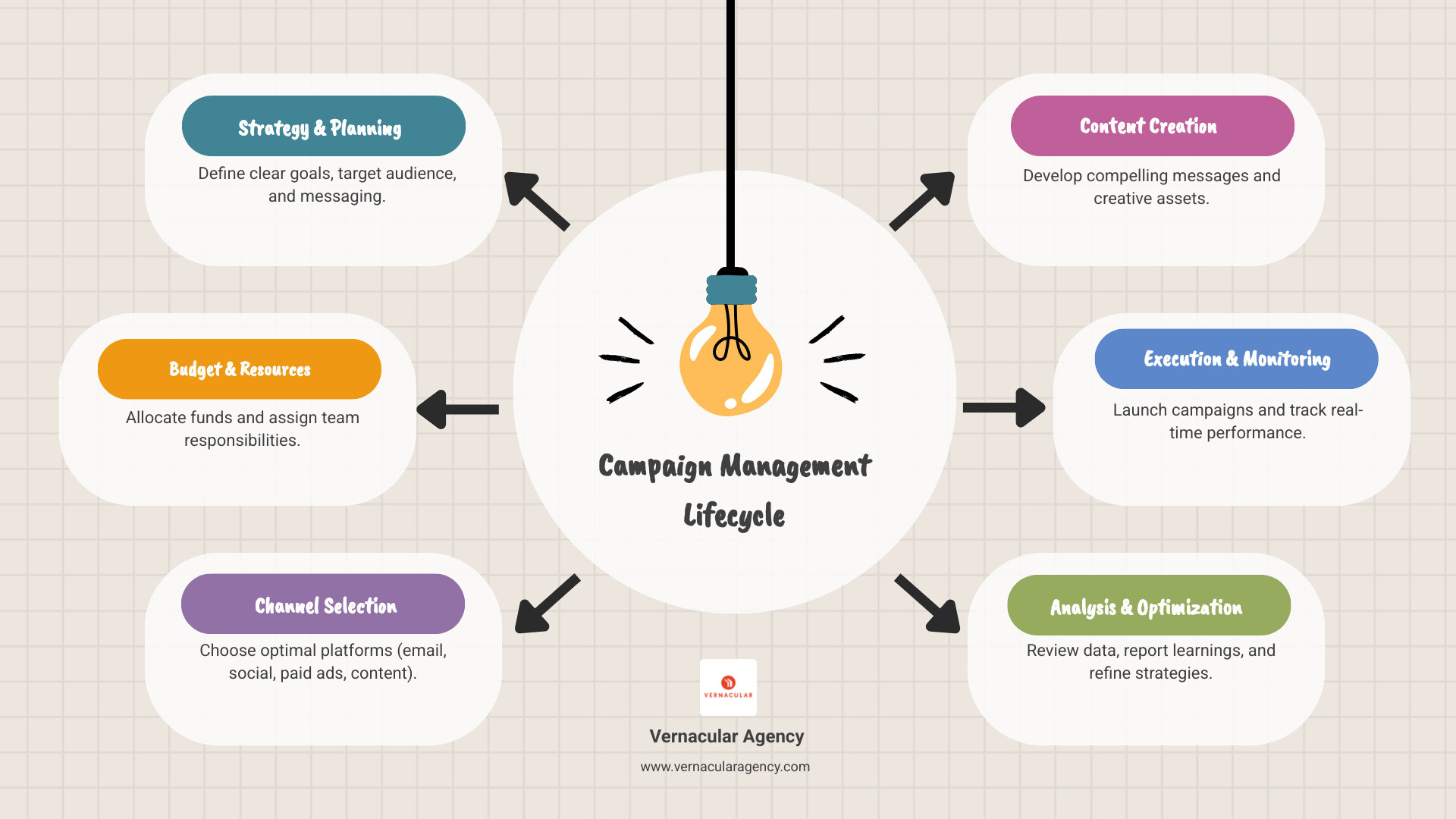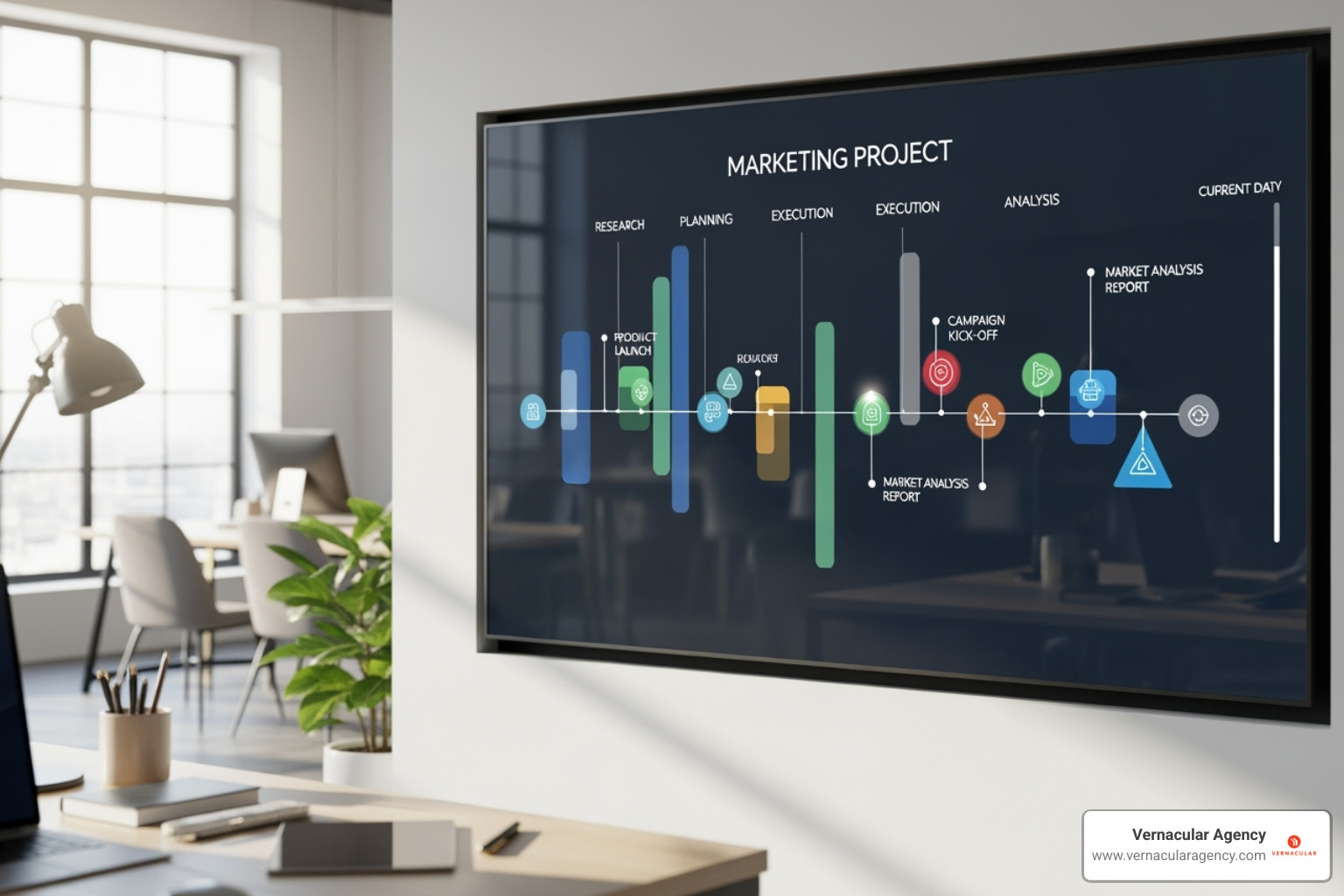Marketing campaign management is the systematic process of planning, executing, tracking, and optimizing marketing initiatives to achieve specific business objectives. Successful campaign management includes:
Key Components:
Research shows that marketers who plan projects proactively are 356% more likely to report success. Yet many businesses struggle with scattered campaigns, wasted budgets, and inconsistent messaging. Without proper structure, even brilliant creative ideas fall flat, and misalignment between sales and marketing can cause revenue to decline. When done right, effective campaign management transforms marketing from scattered activities into a strategic growth engine that drives measurable results.
I'm Rebecca Falzano, Creative Director with nearly 15 years of experience guiding content creation and marketing campaign management across shelter magazines in New York City and Maine. I've seen how proper campaign management transforms ideas from initial spark to final success, working with talented teams to craft narratives that truly resonate with target audiences.

Starting a marketing campaign management project requires a clear plan. Just as you'd map a route for a road trip, a marketing campaign needs a strategic path to turn a brilliant idea into measurable results. A campaign is a focused effort to guide your audience toward your solution, not just random ads.
The magic happens when you plan ahead. Research shows that marketers who plan projects proactively are 356% more likely to report success. This is the difference between campaigns that fizzle out and those that drive real business growth. Unplanned work can seriously derail your results, eating up resources and leaving you scrambling.
At Vernacular Agency, we've seen how proper Marketing Campaign Strategy & Management transforms scattered marketing activities into cohesive, results-driven campaigns.
Every successful campaign is built on these essential blocks:
In today's noisy digital world, sloppy campaign management is a luxury you can't afford.
Misalignment between sales and marketing is the number one reason company revenue declines. Well-managed campaigns bridge this gap, creating shared goals and clear communication that lead to improved ROI.
Without a clear, structured process, marketing campaign management can feel like steering a ship in a fog. We've developed a proven 7-step process that transforms campaign chaos into strategic success, guiding clients from idea to measurable results.

This process flows through three phases: planning (steps 1-4) to build the foundation, execution (steps 5-6) to bring the campaign to life, and analysis (step 7) to learn and improve.
Every campaign must answer: what are we trying to achieve? Use the SMART framework (Specific, Measurable, Achievable, Relevant, Time-bound) to set clear goals, like "boost organic website traffic by 25% in three months." Then, identify the Key Performance Indicators (KPIs) that track progress. For lead generation, this might be cost per lead; for brand awareness, it could be social media mentions; and for sales, it's conversion rates and return on ad spend. Defining success upfront eliminates guesswork.
Go beyond basic demographics to understand your ideal customers' psychographics (values, interests) and behavioral data (past purchases, website interactions). Use this research to create detailed buyer personas—rich portraits of real people with specific challenges your product can solve. Then, segment your audience into smaller groups based on their customer journey or needs. This allows you to craft messages that feel personally relevant, often managed through CRM Solutions.
This practical step ensures your campaign is realistic and properly equipped. Break down your budget into clear categories: ad spend, tool costs, content creation, and personnel time. Use data from past campaigns to inform your current budget. Beyond money, plan your resources by mapping out who is doing what and what tools they need to prevent last-minute scrambles.
With your audience and budget defined, choose the channels that offer the biggest impact. The goal is not to be everywhere, but to be effective where it matters. Develop an omnichannel strategy for a seamless experience across platforms like Email Marketing, social media, content marketing, PPC advertising, and SEO. Match your channel selection to where your audience spends their time. For example, email excels at lead nurturing, while social media is great for brand awareness and community building.
Here, strategy becomes content that connects with people. Develop a content strategy that outlines what you'll create, your themes, and your publishing schedule. Use creative briefs to guide your team in producing assets that consistently reflect your brand voice and value proposition. As our work in Content Creation & Creative Direction shows, every asset should be strategically designed to move people toward your campaign goals.
Launching the campaign is just the beginning. Once live, immediately shift into monitoring mode. Use analytics dashboards to track your KPIs in real-time, watching for early signs of what's working. Use A/B testing to optimize performance—if an email has low open rates, test new subject lines. Workflow automation can handle repetitive tasks like scheduling posts, freeing up your team to focus on strategic adjustments. Successful campaigns evolve based on real performance data.
In this final step, dive deep into the data to understand not just what happened, but why. Compile reports evaluating performance against your initial goals and KPIs. Your post-campaign review should ask what exceeded expectations, where you fell short, and what you learned. These insights become the foundation for optimization strategies for future campaigns. This continuous cycle transforms marketing campaign management from a series of one-off efforts into a strategic growth engine.
Managing modern campaigns with spreadsheets and gut instinct is like navigating with a paper map. Today's marketers need sophisticated tools to handle the flood of data, multiple channels, and high customer expectations. This is where marketing campaign management software, powered by automation and AI, becomes essential.
Campaign management software creates a centralized hub, bringing all scattered pieces of your campaigns into one organized space. This boosts efficiency by automating repetitive tasks and improves team collaboration by providing a single source of truth for timelines, assets, and communication.
Essential features to look for include:
Automation and AI are revolutionizing marketing campaign management. Automation handles tasks like email sequences, social media scheduling, and ad budget allocation, freeing up your team for strategic work.
Artificial intelligence (AI) goes further by learning and making smart decisions. AI-driven insights can spot patterns in data that a human might miss. Predictive analytics helps optimize campaigns before launch, while hyper-personalization delivers incredibly relevant customer experiences. Chatbots can handle customer inquiries instantly, and some AI tools can even assist with generating ad copy and subject lines. This is especially valuable for technical work like SEO Website Optimization & Management, where data analysis is critical.
Selecting the right software is like choosing a business partner. Start with a needs analysis to identify your biggest goals and pain points. Key factors to consider include:
Your choice will also depend on your business size. Small businesses typically need affordable, all-in-one solutions with core functionalities. Enterprises require more sophisticated features like advanced segmentation, complex automation, and robust security. Always request demos or trials to test the software with your actual workflows before making a final decision.
True marketing campaign management mastery goes beyond checklists and tools. It's about strategic thinking, data-driven decisions, and ensuring everyone works together toward the same goals.

Misalignment between sales and marketing is the number one reason why company revenue streams slow down or decline. When these teams work in harmony, the impact is transformative. Success starts with shared goals, where marketing focuses on generating qualified leads and sales provides feedback on lead quality. Improved communication through regular check-ins and shared dashboards ensures both teams understand each other's challenges and objectives. A clear lead scoring process creates a smooth handoff, eliminating frustration and improving conversion rates. This alignment is as crucial as our Public Relations & Strategic Communications efforts, ensuring the entire organization speaks with one voice.
Even the best-planned campaigns face obstacles. Here are common challenges and how to approach them:
The campaign manager role has evolved from project management to strategic leadership. Today's campaign managers are:
This evolved role involves orchestrating the entire campaign ecosystem to achieve strategic goals. At Vernacular Agency, our team embodies this modern approach, as you can see on our About Us page.
Marketing campaign management can seem complex, so we've answered some of the most common questions we receive.
Measuring the ROI of brand awareness is challenging but possible. Instead of tracking direct sales, focus on leading indicators and long-term impact. Use attribution models to see how awareness efforts contribute to conversions over time. Key metrics to track include:
Think of your marketing strategy as the long-term blueprint for your entire marketing effort. It answers who you are, who you're trying to reach, and what makes you different. It's your north star. A marketing campaign is a short-term, focused project within that strategy, designed to achieve a specific goal, like launching a new product or promoting an event. You'll have one overarching Marketing Strategy but run many different campaigns throughout the year to support it.
Creativity often trumps cash. Small businesses can run effective campaigns by being strategic:
The journey through marketing campaign management doesn't have to feel overwhelming. Think of it like learning to steer – once you understand the compass, map out your route, and get familiar with your tools, what seemed impossible becomes second nature.
We've covered the importance of clear goals, the 7-step process from planning to optimization, and the power of today's analytics and AI. We've also explored advanced strategies like aligning sales and marketing to maximize impact. The key takeaway is that structured processes work. A data-driven, continuous improvement mindset is what separates successful campaigns from forgotten ones.
At Vernacular Agency, we've seen this approach transform businesses. We believe in combining strategic thinking with flawless execution to build campaigns that deliver measurable results. Your next campaign doesn't have to be a leap of faith; it can be a calculated step toward your goals.
Ready to turn your marketing efforts into predictable, measurable results? Let us manage your media buying and help you build campaigns that truly move the needle for your business.